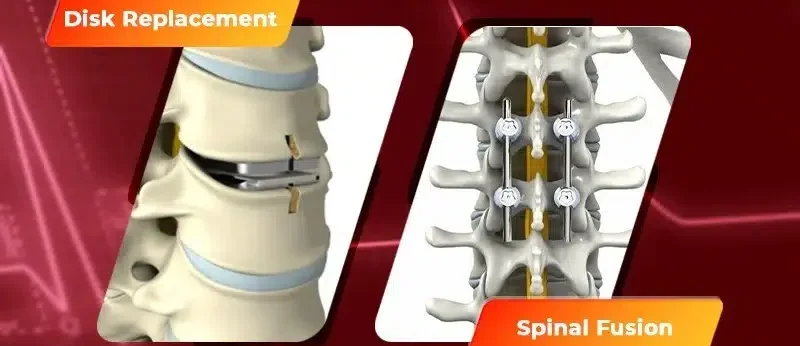What Are the Benefits of Cervical Disc Replacement Over Fusion?

Cervical disc replacement surgery and fusion are both surgical options for treating degenerative disc disease in the neck. While fusion has been the traditional approach, cervical disc replacement (CDR) has gained popularity due to its potential advantages.
Studies have reported a success rate of around 85-95% for cervical disc replacement, with many patients experiencing significant improvement in symptoms and quality of life. Patients undergoing cervical disc replacement often report high satisfaction with the procedure.
Many experience improved neck motion, reduced pain, and a quicker return to normal activities. The rate of revision surgery following cervical disc replacement is relatively low, with studies estimating a revision rate of less than 5% at ten years post-surgery.
Additionally, while the initial cost of cervical disc replacement may be higher than fusion surgery, some studies suggest that the long-term cost-effectiveness of disc replacement may be comparable or even favorable due to the lower risk of revision surgery and better long-term outcomes.
In this blog, we’ll explore the benefits of cervical disc replacement over fusion.
What is Cervical Disc Replacement?
Cervical disc replacement surgery involves removing a damaged or herniated disc in the neck and replacing it with an artificial disc implant. This procedure aims to preserve motion in the neck and alleviate symptoms such as pain, numbness, and weakness. In contrast, fusion surgery involves removing the damaged disc and fusing the adjacent vertebrae, limiting motion in that part of the spine.
Dr. Puneet is a leading expert in Cervical Disc Replacement (CDR) and is known for his skill and innovation in the field. With a focus on patient-centered care, he has achieved remarkable success rates and high patient satisfaction. Dr. Puneet is renowned for advocating CDR over fusion, emphasizing its benefits, such as preserved motion, reduced risk of adjacent segment disease, and faster recovery.
What are the Benefits of Cervical Disc Replacement Over Fusion?
Cervical Disc Replacement offers several advantages over fusion, such as:
1. Preservation of Motion
One of the primary benefits of cervical disc replacement is the preservation of neck motion. Unlike fusion, which restricts movement in the fused segment, disc replacement allows for more natural neck motion. This can lead to a more comfortable and functional patient outcome, especially in neck-flexible activities.
2. Reduced Risk of Adjacent Segment Disease (ASD)
Adjacent segment disease (ASD) is a condition that can occur after fusion surgery. In this condition, the vertebrae above or below the fused segment experience increased stress and degeneration. Cervical disc replacement may reduce the risk of ASD by maintaining normal motion and reducing stress on adjacent segments.
3. Lower Risk of Revision Surgery
Studies have shown that cervical disc replacement patients may have a lower risk of requiring revision surgery than fusion patients. This could be due to the preservation of motion and reduced risk of ASD associated with disc replacement.
4. Faster Recovery and Return to Activity
Cervical disc replacement surgery is typically associated with a faster recovery than fusion surgery. Patients may experience less post-operative pain and stiffness and can return to normal activities sooner.
5. Potential for Better Long-Term Outcomes
Some studies suggest cervical disc replacement may provide better long-term outcomes than fusion, particularly in maintaining neck motion and reducing the need for additional surgeries.
Two satisfied patients of Dr. Puneet shared their experiences.
One said, “I had been suffering from neck pain for years and was hesitant about surgery. Dr. Puneet explained the benefits of cervical disc replacement, and I decided to do it. I am so glad I did! My neck feels much better, and I can move more freely. Thank you, Dr. Puneet!”
The other shared, “After my cervical disc replacement surgery with Dr. Puneet, I experienced immediate relief from the excruciating pain I had been living with for years. The recovery was smooth, and I am returning to my daily activities without discomfort. I highly recommend Dr. Puneet to anyone considering this surgery.”
What is the Cost of a Cervical Disc Replacement in India?
In India, cervical Disc Replacement (CDR) surgery usually costs between ₹5,00,000 and ₹8,00,000, or around $6,700 to $10,700 in US dollars.
However, it is crucial to remember that these estimates may vary depending on the hospital, surgeon’s fees, location, and any other operations or tests necessary. It is best to speak with a healthcare physician or hospital for a more precise quotation, depending on your requirements.
Conclusion
Cervical disc replacement offers several advantages over fusion surgery, including preservation of motion, reduced risk of ASD, lower revision rates, faster recovery, and the potential for better long-term outcomes. Global statistics indicate high success rates and patient satisfaction with cervical disc replacement, making it a promising option for patients with degenerative disc disease in the neck.
However, individual factors and preferences should be considered when deciding between cervical disc replacement and fusion. Patients should consult with their healthcare provider to determine the most appropriate treatment option for their condition.
FAQs
1. Is cervical disc replacement surgery painful?
Pain levels vary from person to person, but patients generally experience less pain than fusion surgery due to motion preservation.
2. How long does it take to recover from cervical disc replacement surgery?
Recovery from cervical disc replacement surgery typically takes about 4 to 6 weeks.
3. Can I still play sports or engage in physical activities after cervical disc replacement?
Many patients can resume sports and physical activities after recovery, though it’s best to consult your surgeon for specific recommendations.
4. Are there any restrictions after cervical disc replacement surgery?
Initially, you may be advised to avoid certain activities, but as you recover, you should gradually be able to return to your regular routine.
5. How long do artificial discs last in the neck?
The longevity of artificial discs varies, but they are designed to last for many years, and some studies suggest they can last a lifetime.
Explore more blogs:
